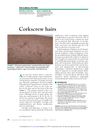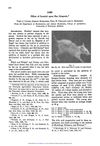January 2023 in “Italian journal of dermatology and venereology” The supplement effectively improved hair growth and reduced hair loss safely.
 3 citations,
August 2022 in “JAAD international”
3 citations,
August 2022 in “JAAD international” Taking a daily multivitamin may be enough to promote hair growth in people with alopecia.
 3 citations,
November 2020 in “Curēus”
3 citations,
November 2020 in “Curēus” A child's hair loss from alopecia areata was fully reversed in five months using diet and supplements.
24 citations,
May 2017 in “PubMed” Biotin supplements for hair improvement are popular without scientific proof of effectiveness.
 August 2022 in “Journal of the American Academy of Dermatology”
August 2022 in “Journal of the American Academy of Dermatology” The authors agree they didn't discuss the risks of too much micronutrients and value the focus on biotin deficiency signs and treatment effectiveness.

A boy on a ketogenic diet and anti-epileptic drugs developed skin issues due to stopping vitamin supplements, which improved with proper supplementation.
December 2021 in “Vestnik Rossiĭskoĭ akademii meditsinskikh nauk / Rossiĭskaia akademiia meditsinskikh nauk” Personalized vitamin and trace element treatment improves hair density and reduces hair loss in men with early-stage androgenic alopecia.
105 citations,
March 2014 in “British journal of dermatology/British journal of dermatology, Supplement” Alopecia areata patients often have low vitamin D levels, suggesting they might benefit from vitamin D supplements.
 34 citations,
January 1943 in “Endocrinology”
34 citations,
January 1943 in “Endocrinology” Adrenalectomy boosts hair growth and melanin in black rats, even with vitamin B¹ deficiency.
 27 citations,
October 1945 in “Endocrinology”
27 citations,
October 1945 in “Endocrinology” Synthetic hormone treatment reduces melanin and hair growth in rats.
 8 citations,
January 2007 in “Hair transplant forum international”
8 citations,
January 2007 in “Hair transplant forum international” Vitamin B12 improves the health and growth of hair micrografts.
 2 citations,
June 2018 in “Sudan journal of medical sciences”
2 citations,
June 2018 in “Sudan journal of medical sciences” Low vitamin D levels can cause hair loss and supplements may improve it.
 May 2024 in “European Journal of Immunology”
May 2024 in “European Journal of Immunology” Vitamin B5 and coenzyme A may help regulate the immune system and could improve treatments for chronic diseases and cancer.
 3 citations,
November 2018 in “PubMed”
3 citations,
November 2018 in “PubMed” People with TED often have low B12 levels and might benefit from B12 supplements.
 1 citations,
August 2018 in “Journal of The American Academy of Dermatology”
1 citations,
August 2018 in “Journal of The American Academy of Dermatology” Teledermatology could improve skin care access, but its success depends on technology, quality strategies, and payment policies; also, vitamin B12 might help treat a specific hair loss condition.
January 2022 in “Indian journal of paediatric dermatology” Children with early graying hair might have lower levels of certain nutrients like zinc, magnesium, and Vitamin B12.
 12 citations,
December 1987 in “Cancer Chemotherapy and Pharmacology”
12 citations,
December 1987 in “Cancer Chemotherapy and Pharmacology” Vitamin E in the diet might help protect against hair loss caused by the chemotherapy drug doxorubicin in rabbits.
 3 citations,
April 2015 in “Cleveland Clinic Journal of Medicine”
3 citations,
April 2015 in “Cleveland Clinic Journal of Medicine” The woman has scurvy and needs more vitamin C.
 October 2024 in “Molecular Nutrition & Food Research”
October 2024 in “Molecular Nutrition & Food Research” Vitamin and mineral imbalances may affect hair loss, but more research is needed.

Older people tend to have higher biotin levels, which are weakly linked to certain blood components and negatively linked to triglycerides; biotin should be checked in patients with high triglycerides or medication-related skin issues, and only supplemented if deficient. Vitamin D and folate deficiencies are linked to specific skin conditions.
May 2004 in “Biochimica et Biophysica Acta (BBA) - Molecular Basis of Disease” Vitamin E affects liver metabolism, enhancing stress resistance, reducing blood clotting, and altering hormone processing.
 19 citations,
January 2016 in “Dermatology Research and Practice”
19 citations,
January 2016 in “Dermatology Research and Practice” The study concluded that hair loss in Indian women is not significantly linked to anemia or thyroid problems, but checking thyroid function could help those with ongoing hair loss.
18 citations,
July 2016 in “Clinics in dermatology” Nutrition affects skin health differently based on age and condition.
 7 citations,
May 2022 in “The Journal of Dermatology”
7 citations,
May 2022 in “The Journal of Dermatology” Hair loss is a frequent long-term effect of COVID-19, and oral minoxidil is the most common effective treatment.
 5 citations,
December 2020 in “BMC Dermatology”
5 citations,
December 2020 in “BMC Dermatology” Bariatric surgery improves skin conditions and metabolism but may cause nutritional deficiencies and hair loss.
 5 citations,
March 2021 in “International Journal of Dermatology”
5 citations,
March 2021 in “International Journal of Dermatology” Biotin supplementation during isotretinoin treatment for acne may help maintain skin hydration and improve hair growth.
 2 citations,
May 2022 in “Cosmetics”
2 citations,
May 2022 in “Cosmetics” Further research is needed to understand how the microbiome affects hair loss in Alopecia Areata.

research Iron
January 2014 in “Reactions Weekly” A woman had nausea and constipation from iron pills taken for hair loss due to low iron.
 July 2024 in “Brazilian Journal of Clinical Medicine and Review”
July 2024 in “Brazilian Journal of Clinical Medicine and Review” Hair loss after bariatric surgery is common due to nutrient deficiencies and rapid weight loss.
 20 citations,
November 1943 in “Experimental Biology and Medicine”
20 citations,
November 1943 in “Experimental Biology and Medicine” Inositol helped prevent and cure hair loss in rats.






















